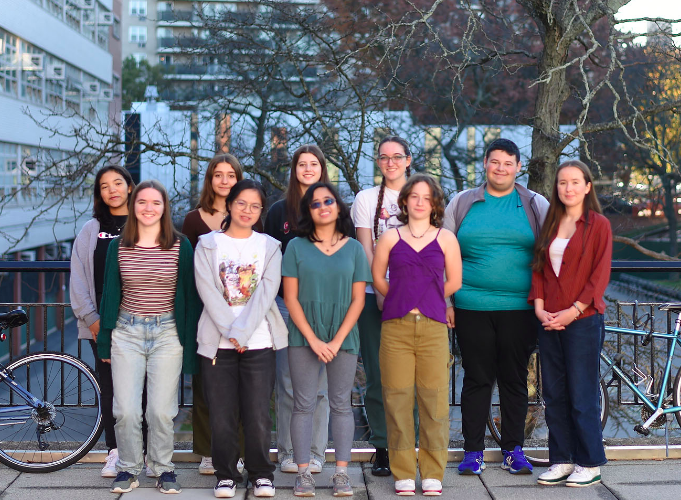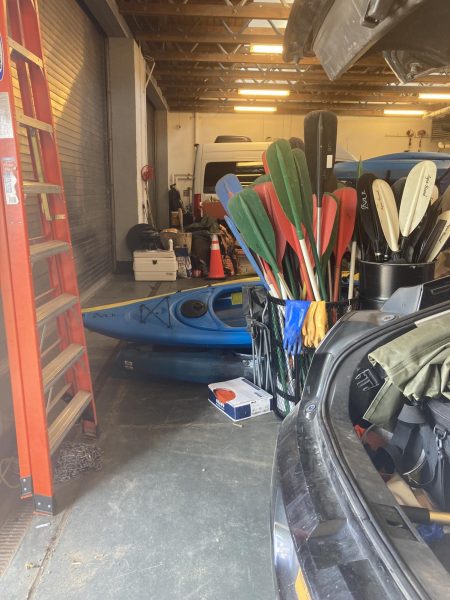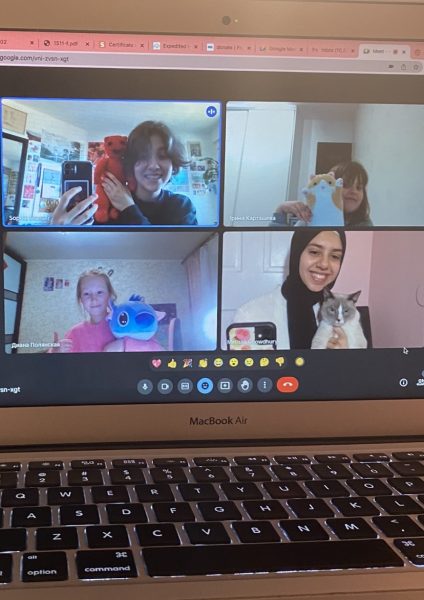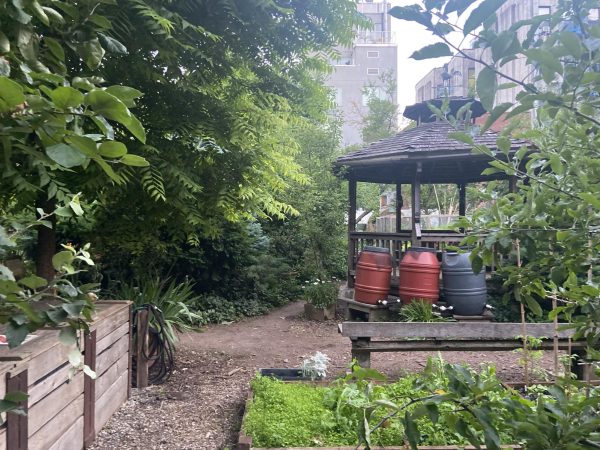December 2022 Advice Column: Setting Up For Success in the Winter Months
The Copy Chiefs and Editors-in-Chief of ‘The Science Survey’ are here to answer your questions about maximizing your academic success during the winter months at Bronx Science during the 2022-2023 academic year.
Copy Chiefs and Editors-in-Chief of ‘The Science Survey,’ who wrote this December 2022 Advice Column, pose for a photo. Depicted above are Katia Anastas ’23, Sela Emery ’23, Helen Stone ’23, Katrina Tablang ’23, Ethan Weinberg ’23, Felicia Jennings-Brown ’23, Nora Sissenich ’23, Elizabeth Colón ’23, Monica Reilly ’24, and Tiffany Wang ’24.
We, the Copy Chiefs and Editor-in-Chiefs of The Science Survey, Bronx Science’s official newspaper, know that all students have lots of questions about how to manage the whirlwind of the months ahead. Still, never fear, we’re here to give you our most sage advice and offer some words of wisdom. Each and every one of us has been in your shoes — we’ve all failed tests, stressed over homework assignments, and worried about achieving a healthy work-life balance. Having navigated through the highs and lows of high school, we can help you to do the same. We hope that you will find our advice to be useful!
Lots of love,
Katia Anastas ’23, Sela Emery ’23, Helen Stone ’23, Katrina Tablang ’23, Ethan Weinberg ’23, Felicia Jennings-Brown ’23, Nora Sissenich ’23, Elizabeth Colón ’23, Monica Reilly ’24, and Tiffany Wang ’24
How can I manage stress during junior year?
Nora: When you’re taking on a heavy course load, extracurriculars, and the many other stressors of junior year, you might have weeks where you feel like you’re drowning in work. Firstly, remember to take breaks! Even when you have a multitude of things to do, it’s okay to put your work aside for a little bit and find something relaxing to do. Whether it’s exercise, spending time with friends, or pursuing a creative hobby, finding something that fulfills you outside of school is crucial to enduring and managing stress.
Another important skill is knowing how to balance your many obligations. This means you have to prioritize! Attempting to give every assignment, test, and extracurricular equal time is at best inefficient and will likely backfire. If it’s one of those weeks where you have three back-to-back test days, determine what subject you’re struggling with the most and adjust the time you spend studying accordingly. And don’t underestimate the value of tools like Google Calendar (or a physical one, such as the one in your school planner!). They can help you keep track of appointments, plans, and tasks you need to get done in both the short term and the long term.
Unfortunately, sometimes stress is unavoidable. When you find yourself overwhelmed, take it week by week, and remind yourself that, yes, it’s hard, but it’s not forever. You can and will get through this. There’s a phrase: “The only way out is through.” Visualize your future goals and remind yourself what you’re working towards.
How can I maintain a balance between my school and personal life?
Helen: Having separate school and personal lives is super important in maintaining positive mental health and to making your high school years as enjoyable as they can possibly be. That said, I know that the Bronx Science workload can sometimes be stressful, and it’s tempting to isolate yourself just to get all your work done. Don’t do this! Make sure you’re getting out and finding time to do what makes you happy. I know it’s easier said than done, but the truth is, there’s no single way to balance school and personal life. It’s all about managing your time and finding the work/life balance that feels right for you.
I’d recommend dedicating two out of the three days of the weekend to complete school work, and leaving the third day free to spend time with friends, watch a show and relax, practice your hobby, or whatever else you want to do that makes you happy. Maybe for you, this ratio looks like working on Friday evening and Saturday, and having Sunday free. Maybe it looks like working on Saturday and Sunday and having Friday evening free. Obviously, you should adjust this framework to fit your personal needs, because nobody is the same! Most importantly, get all of your work done, but don’t stress yourself trying to do it! Try to space out the workload, be efficient, and make activities other than work a priority. I promise it will make your high school experience much more enjoyable.
What are some good strategies for studying for tests?
Ethan: Oftentimes, studying for tests is stress-inducing, especially at Bronx Science. It usually involves lots of memorization and practice, which causes students to worry. For every subject, teachers are obligated to inform students about a test at least a week in advance. Don’t waste your time throughout the week and wait until the last minute; instead, take advantage of the time and study in smaller amounts throughout the span of the week rather than delaying the inevitable and cram-studying the day before the exam. I have cram studied for tests far too many times, and can attest that this strategy is rarely successful.
Many subjects, especially social studies and science classes, require lots of memorization for tests. I’d suggest using flashcards –whether that is a quizlet or handmade cards – to memorize concepts and events. I recommend studying with a friend; one person should read out the flashcards and have the other guess the answers, and then switch so both people get a chance to study the concepts. You can also study flashcards independently, but studying with a friend will inspire greater confidence in your ability to understand the test material. By having someone else to study with, you won’t feel alone, and you can rely on that person to help you with any misunderstandings that you might have.
I’d also recommend looking back at notes or PowerPoints (if your teachers post them to Google Classroom or another resource). Don’t fixate on these for too long, but they might serve an important purpose and will likely have every bit of information that a teacher expects you to know. You can even use the PowerPoints or your notes to make your study flashcards.
On other exams, especially math tests, practice problems are the best way to go. Practice doesn’t always make perfect, but it will give you a feel for what test questions might look like. I’d especially recommend completing review sheets from teachers, if they are provided. Those will likely be similar to actual test questions, so be sure to complete them and make sure you understand the concepts. Complete these problems independently, as if you were actually taking the test. You can also practice with questions from previous homework assignments, which should be a useful tool for studying individual topics. If you have any questions about a test or simply want to review (especially for math), go to SGI and ask your teacher any questions you might have. Teachers are ultimately there to help you and provide you with the tools for success. Through all of these methods, you can effectively study for your upcoming test and feel confident about your ability to perform well.
What are some good strategies for effective time management?
Elizabeth: I believe that everyone, including myself, can always find ways to improve their time-management skills, regardless of how effective they think their schedules are. However, setting apart some time each week to keep track of daily assignments is a great place to start. Whether it is by using a tracker on Google Sheets, a list in the notes app on your phone, or even the student planners provided by our school each year, writing down each assignment can help you get a sense of your overall workload.
Now that the hardest part has been taken care of, you can begin to organize your week’s assignments and other time commitments in order of priority. When you have a good sense of all your responsibilities for the week, start to create a general plan for what your week will look like. If possible, be even more specific – what could you be doing every hour of the day to maximize your time? Set specific blocks of time to work on your most important tasks first, taking into account their due dates and how long each task will take you to complete.
Make sure to break down big projects into manageable chunks; if you see yourself having to spend hours on a research paper or studying for that math test, plan to spend just a few minutes on it each day of the week. Your time blocks should realistically be around half an hour and shouldn’t be longer than an hour each, as trying to power through assignments for half of your day is a sure way to burnout. Believe me, I’ve tried.
Sticking to a strict schedule like this might seem nearly impossible. I would definitely agree that it’s unrealistic to be asked to spend all your time outside of school focusing solely on your responsibilities when your time spent in school is already mostly occupied with work.
That’s why it’s just as important to schedule breaks between blocks of work and give yourself space to relax and unwind. At the same time, try not to go overboard with them – it’s all about balance!
Finally, make sure to allow yourself some leniency. There is no perfect, one-size-fits-all solution to time management, and people find certain methods work better for them than others. Trying different things and allowing yourself to make mistakes is important so that you can find what works best for your needs. Overall, making sure that you don’t leave assignments for the last minute is the key to time management. Procrastination may be a habit that’s hard to grow out of, but planning ahead can help you work towards the most efficient use of your time.
How can I establish good relationships with my teachers?
Sela: Teacher relationships are a two-way street. What you put into each class will be what you get out of it in the form of grades, yes, but will also be reflected in your connection with teachers. Participation in class is the best way to put this phenomenon into effect. While weeks at Bronx Science are admittedly exhausting, it’s important to stay engaged in class (even during the agonizingly early periods in the morning). From mere questions embedded within a lesson to scheduled class discussions, voicing your thoughts is the best way to reach teachers. Participating is mutually beneficial; it allows you to more fully absorb the class content and creates more opportunities for interaction with your teachers. As tempting as it may be to catch up on last night’s sleep during class, teachers greatly appreciate your active involvement, and in the long run, you will too.
Utilizing SGI is a second way to establish closer relationships with your teachers. In the time between the end of ninth period and the beginning of after-school activities, you can speak to your teachers about anything you wish. They are there as a valuable resource, and are more than willing to help you with school problems, college essays, or other queries. If you are someone who is easily intimidated by the sheer amount of people engaging during class periods, SGI is a perfect solution. It allows you to receive one-on-one, personalized help, helping you bond with your teachers who would otherwise not have any opportunities to get to know you better as a person.
Perhaps the most straightforward strategy is to complete all of your coursework thoroughly and on time. Bronx Science students admittedly have immensely rigorous schedules, and you may be balancing multiple challenging classes at once. Through productive time management, however, you should be able to keep up with your work for each subject. Your teachers will greatly appreciate this over anything else, as it makes their job much easier. As time passes, they will take notice of individuals who are consistently putting forth their best effort, and your dedication to completing assignments will pay off. In sum, establishing relationships with teachers in a school of roughly three thousand students can be challenging, but through simple solutions, doing so is well within your reach.
How can I overcome my fear of participating in class?
Katrina: Ask yourself: what exactly about participating in class scares you? Is it having everyone’s attention on you? Perhaps you’re scared of giving the wrong answer? Or maybe it’s something specific to one class?
Unfortunately, a one-size-fits-all solution to fear does not exist because fears are highly individualized and some people are going to react more positively to a certain approach than others. However, being able to pinpoint the root cause of your fear is a good first step toward overcoming it because, oftentimes, it can help put things into perspective.
Without knowing the full context, I can’t say what is most and least likely to work for you — but as someone who has had to become more comfortable with participating in class, I can share what has worked for me.
My issue with class participation was that I could never find the right time to chime in, and when I did have an opportunity, the perfect words to express myself eluded me. I have always preferred writing to speaking, because you can always delete or rewrite a sentence you’ve written, but once you’ve said something, it is much more difficult to change courses.
When I first actively started trying to work past this, I found that it was easier if I wrote down brief notes on what I wanted to say before I raised my hand. It gave me a sense of relief to know what and how I was going to answer the question. With practice, I have become more confident in my ability to improvise what I’m going to say while speaking; it has been a gradual process, as overcoming fears often is.
As I mentioned earlier, this might not be the best method for you to overcome your fear — that’s fine! What matters is this: figuring out what your main challenge is and finding a way to relate it to something you are comfortable with is a useful strategy. Of course, the more you do something, the easier it will be. The results might not be obvious at first but stick with it! It’ll be worth it in the end.
What are some good ways to maximize your productivity on long commutes to and from school?
Monica: Maximizing your time on commutes means different things for everyone. I often use my long commute to read a book while reflecting on my day gone by or mentally preparing for my day to come. If I have a test that day, I will usually spend my commute to school reviewing my notes in order to feel more prepared.
Others use their commute in order to catch up on much-needed sleep, which is a great way to utilize your commute to be more productive throughout the day. Taking a nap is a great way to feel more refreshed and to have more energy throughout your school day.
You could use your commute to complete a homework assignment that you were unable to get to the night before, especially if you had a heavy workload the previous day. You can even use this time to socialize, although I definitely prefer talking to my friends on the commute back home versus on the way to school.
Listening to podcasts on the way to and from school is a great way to learn more about topics you are interested in while also having the chance to relax. You could also listen to music or an audiobook, whichever is more appealing to you.
Adjust what you do on your commute to fit whatever you need most to address on that given day. Do you have a test that you are stressing about? Then you should review your notes on the way to school. Did you stay up late during the previous night completing homework? Then you should take a nap on the way to school, so that you feel refreshed for the day ahead of you. Are you looking to relax? Then you should read a book or listen to music on the way to school.
Most importantly, try not to look at your commute as a major inconvenience, because, no matter how annoying it can be to have to wake up early and spend an hour or more just to get to school, we are all stuck with it for these four years. Instead, look at it as a way to catch up with friends, on reading, or on sleep. Turn this inconvenience into a helpful resource.
How should I approach choosing extracurricular activities in terms of eventually crafting my college application?
Tiffany: Focusing primarily on appealing to colleges is not going to get you far. Instead, try attending teams or clubs that truly interest you, which will improve your experience significantly. Doing activities that suit your interests will allow you to actively participate, have a better experience, and enjoy your time. Engaging in extracurriculars you enjoy may even allow you to climb the ranks and get a leadership position. This would be far more appealing for colleges than joining many different extracurriculars all at once. Whichever extracurricular activities you end up choosing, stick with them. Staying an integral part of the club does not mean leading the charge on everything, but it is important to participate and be involved as much as you can. Bronx Science already is a rigorous experience. Colleges will appreciate you much more if you enjoy your experience while learning. Quality is better than quantity in every way; becoming involved in one club is more important to colleges than the dozens of clubs you might attend cursorily once or twice a month.
Volunteering is one of the most important parts to your college applications. Showing that you are involved in extracurricular activities outside of school allows colleges to have an insight of what you do in your free time. Additionally, some volunteer places provide awards and leadership positions, enhancing your college application. By showing that you have contributed hours of volunteer time, colleges will assume that you are not only school-driven but also care about your community. There are numerous volunteer opportunities available to you. You can volunteer at places where you plan to work in the future, supplying you with experience. Beside the academic side, volunteering has many benefits, as it provides a real and positive effect on your community, helping you to learn new skills and to meet new people, and even to gain confidence.
When choosing extracurriculars, keep these factors in mind: focus on career paths in which you are interested, passions you’d like to pursue, and your planned college major. Other than the academic aspect, colleges often use your application as a way to get a ‘sneak peek’ into your life. If you attend clubs or teams based on your passions and interests, colleges can tell that you are dedicated, making you a stronger candidate. College applications are a way of communicating the real you with colleges, and you should therefore be honest.
How do I refrain from comparing myself to my peers, academically and beyond?
Felicia: It’s hard not to compare yourself to others, especially at a school where aspects such as grades and test scores are so important. Academic validation is great, yes — I wouldn’t be going to this school if I didn’t crave it myself. But validation shouldn’t come at anyone else’s expense, and anyone else’s validation shouldn’t come at yours.
My first bit of advice is avoid putting yourself in that position. Just don’t ask. It is demoralizing to find out that someone else did better than you on a test, especially one that you studied really hard to ace. Whether you’re the one with the better score, or they are, someone will leave the conversation feeling bad about themselves. Don’t bring this situation upon yourself.
If you do end up in a situation where you’re getting compared to someone else, take a step back and acknowledge whatever differences exist between you and the person in question. Understand that your everyday life may look very different from theirs. Different people have different priorities. Stuff happens. The result of any assessment depends on the time you put into it; if someone else lives an hour closer to school than you, that’s an hour they can spend peacefully studying that you can’t. If you tried your best and someone else still did a lot better than you, chances are it isn’t your fault.
Finally, the best way I’ve found to refrain from comparing myself is reframing the conversation itself. I catch myself tying my self-worth to my grades pretty often. Each time, though, I do my best to remind myself that I’m worth so much more than a number. It’s great to have a good grade, or be incredibly talented at something, but that doesn’t fully define you. It is frustrating to have a bad grade, or be less talented at something, but that doesn’t matter, because it still doesn’t define you. At the end of the day, it’s not worth your time to compare yourself to others, because your brain works differently than other brains. You have your own strengths, and you can use those in ways other people can’t.
If one event, one grade defined your entire life, what would be the point of attending multiple events? Taking multiple tests? Improvement is always possible. If you have a long commute, it’s still possible to move things around and optimize your studying time for any one class. You’re a person, capable of growth and change, and it’s not worth getting stuck on comparing yourself when you could be focused on getting better. You got this.
How do I deal with really stressful weeks in which I have multiple exams, projects, and long homework assignments?
Katia: Even the most stressful weeks come and go in a flash. Before your alarm goes off on that Monday of a week inundated with exams, projects, and lengthy homework assignments, remember that you only have five quick days to get through and then a weekend to recharge. So, my best advice is to keep calm and carry on.
Still, my more practical advice would center around preparing in advance. Don’t be blindsided by difficult weeks; instead, keep an organized calendar (use your student planner) and mark upcoming assessments and projects. A week or two before you are swamped with work, you should organize your notes, make study guides, lay out practice problems, and start tackling long term assignments.
Also, be sure to collaborate with your peers. We are all in the same boat and don’t have to sail through these choppy waters alone. Make an effort to form meaningful friendships in each of your classes or, at the very least, find people with whom you work well. Then, make study guides together or quiz each other; doing work with friends — cracking a few jokes between difficult physics problems or toiling over history textbook readings together — will ease your burden.
Additionally, keep your schedule outside of school as light as possible during these stressful weeks. While some weeks are great for going to concerts, hanging out with friends, and watching movies, during these more difficult weeks, as one of my friends jokingly says, it’s time to “lock in” and focus on the tasks at hand. However, reward yourself with something relaxing and fun after you’ve gotten through all of your tests and projects, so that you have something to look forward to — a little light at the end of the tunnel.
The most important thing to remember is that we all have those daunting, seemingly endless weeks at Bronx Science. Still, the bottom line is these weeks are always less scary in retrospect and they do in fact end when the 9th period bell finally rings on Friday. You’ll get through it — have a little faith.
Each and every one of us has been in your shoes — we’ve all failed tests, stressed over homework assignments, and worried about achieving a healthy work-life balance. Having navigated through the highs and lows of high school, we can help you to do the same.
Katia Anastas is an Editor in Chief for ‘The Science Survey.’ She loves that journalistic writing equally emphasizes creativity and truth, while allowing...
Sela Emery is a Copy Chief for 'The Science Survey.' She focuses on art history, covering relevant art pieces and exhibitions with each issue. In addition...
Helen Stone is the Editor in Chief and Facebook Editor for 'The Science Survey.' She is interested in journalistic writing because she believes that a...
Katrina Tablang is a Copy Chief for 'The Science Survey.' She enjoys journalistic writing because it enables her to explore a wide variety of perspectives...
Ethan Weinberg is an Editor-in-Chief for 'The Science Survey.” Ethan enjoys journalistic writing, as he believes that by making sense of the issues on...
Felicia Jennings-Brown is a Copy Chief for ‘The Science Survey.’ What she appreciates the most about journalistic writing is its use as a channel to...
Nora Sissenich is an Editor-In-Chief for 'The Science Survey,' a role that she values deeply because it allows her to offer guidance and insight through...
Elizabeth Colón is a Copy Chief for ‘The Science Survey.’ Elizabeth finds that the most appealing aspect of journalistic writing is how much...
Monica Reilly is an Editor-in-Chief for ‘The Science Survey.' She has always loved using the art of journalism to educate and connect with people. She...
Tiffany Wang is a Managing Editor and Advisory Editor for ‘The Science Survey.’ As an avid fan of stories, whether they are nonfiction or fiction,...
Stephan Chirinian is a Staff Reporter for ‘The Science Survey.’ He finds telling a truthful story very compelling when it comes to journalistic writing....











